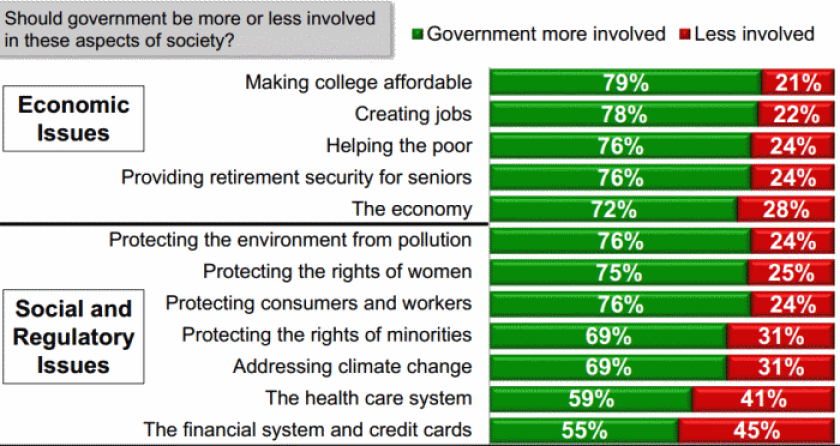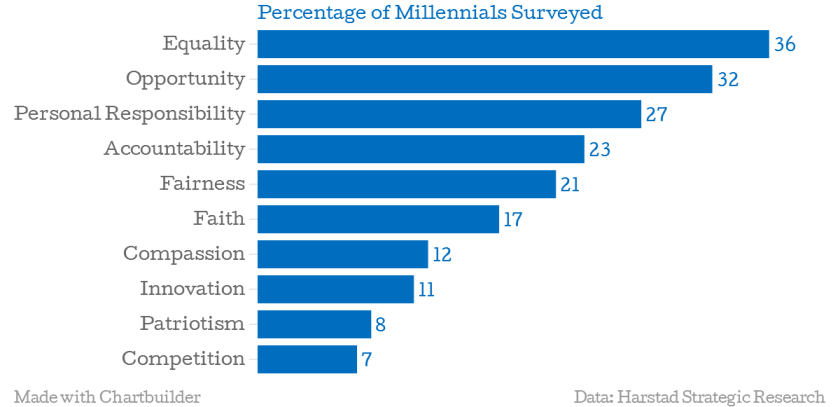So how can elected officials appeal to them?
Results of a nationwide survey published Thursday provide clues to how Millennials might cast their ballots. The survey, conducted by Democratic polling firm Harstad Strategic Research for the Youth Engagement Fund and Project New America, measures their attitudes on a range of issues.
Pollsters interviewed about 2,000 Millennials in late March and April. Here are a few key takeaways from the results:
Millennials favor more government involvement on many issues
Rallying against big government might not have the same appeal to Millennials as it does for other age groups. At least on the economic and social issues included in the poll, they overwhelmingly support more government intervention.Across all issues surveyed, an average of 72 percent of Millennials supported greater government involvement.
Here’s a chart from the polling firm showing how they see government’s role for each issue:

While the results certainly suggest Millennials may favor a more activist government, it’s important to note here that all the issues surveyed highlight more liberal causes.
They’re worried about paying for college
As the cost of higher education continues to climb, it’s no surprise that paying for college is among Millennials' top concerns.The polling firm tested 13 messages, ranging from Obamacare to climate change, to identify which most resonated with Millennials. Curbing the cost of attending college and expanding student aid ranked as the most persuasive issue of those surveyed (see table below).
A separate question about student loans found 87 percent favored lower interest rates on student debt. About a third of Millennials surveyed reported having a student loan; 76 percent of those said they worried about it.
Investment in community colleges garnered similarly high marks in the survey.
Millennials strongly support gun background checks
Stricter background check requirements for firearm purchases emerged as another key issue for Millennials.Fifty-seven percent “strongly favored,” and 26 percent “somewhat favored,” criminal background checks for all individuals, including those buying firearms at gun shows.
In response to a question asking how important various policy stances are in determining voting for a member of Congress, background checks ranked second only behind student loans. The following table shows how Millennials scored the persuasiveness of all issues, grouped on a scale from zero to ten:
| Rank | Issue |
10-7 (Most persuasive) |
6-4 (Middle range) | 3-0 (Least persuasive) |
|---|---|---|---|---|
| 1 | Student Loans | 59% | 31% | 10% |
| 2 | Background Checks | 56% | 31% | 13% |
| 3 | Invest in Good Jobs | 57% | 33% | 9% |
| 4 | Economic Opportunity | 57% | 33% | 10% |
| 5 | Community Colleges | 56% | 34% | 10% |
| 6 | Protecting Rights | 55% | 32% | 13% |
| 7 | Opportunity to Get Ahead | 54% | 34% | 12% |
| 8 | Populism | 53% | 33% | 13% |
| 9 | Abortion | 53% | 33% | 14% |
| 10 | Climate and Renewables | 50% | 37% | 13% |
| 11 | Corruption/Money in Politics | 49% | 38% | 13% |
| 12 | Gridlock Harms The Economy | 48% | 39% | 13% |
| 13 | Obamacare Coverage | 48% | 34% | 19% |
They value equality
If politicians are to successfully woo this crop of new voters, they can’t ignore equality concerns.Polling consistently shows strong support among Millennials for same-sex marriage and other such issues. In the survey, Millennials identified equality as the top value “most important given the challenges we face as a country,” even surpassing opportunity.
Survey respondents were asked to identify their two most important values, shown below:

If Millennials are to gain clout in policymaking, though, they can't afford to sit out elections.
The survey also reported a one cause for concern: There will be a sharp drop in Millennial turnout this November, with only 28 percent reporting they’ll definitely vote in the midterm elections. For the 2016 presidential election, 55 percent said they definitely planned to vote.
A separate poll by Harvard University’s Institute of Politics published a few weeks ago found conservative Millennials are more enthusiastic about voting in November. About 44 percent who voted for Mitt Romney said they definitely planned to vote, compared to 35 percent of young voters who cast ballots for President Barack Obama.
This story was originally published by Governing







